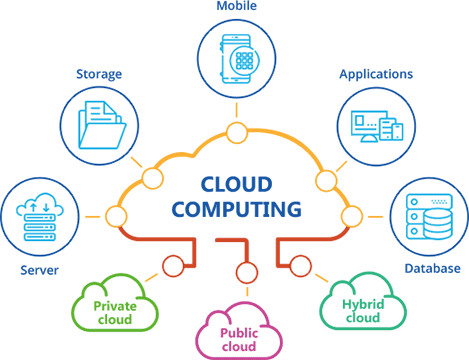It is eye-opening to know how quickly technology advances in only a couple of years. Prior to Cloud Computing, individuals would run applications or projects from programming downloaded on an actual PC or server in their organization. At that time, numerous organizations were attempting to make their own data centers and the individuals who had them would generally hire numerous IT experts and resources for their organization. Notwithstanding, with the complex nature and expanding quantity of IT experts to manage, keeping up with productivity inevitably is a big question.
The fast advancement of technology has given plenty of solutions for some organizations in running and building up their businesses. Presently, an ever-increasing number of organizations are beginning to build their plan of action by depending on Cloud Computing, which has now become another new trend in data center management.
What is Cloud Computing?

The computing services such as servers, databases, storage, organizing, programming, examination, intelligence, and other over the Internet (“the cloud”) is known as Cloud Computing. What does it do? It offers quicker advancement, adaptable resources, and economies of scale. Cloud computing also offers attributes of “pay per use” that empowers business houses to pay just for the services you use, helping to bring down your working costs, run your framework more effectively and scale because your business needs change.
Cloud Computing in Indian Context

In Indian business, Cloud-based services are becoming un-avoidable. To such an extent that, for certain undertakings, it’s hard to oversee development without the Cloud technology. If we contrast what the technology has carried to the Indian organizations, it’s nothing wrong to say that, contrasted with Indian conditions, it has passed on the efficiency that engages associations to decrease capital costs and increase business versatility. Likewise, cloud experts state, the technology has drastically affected the web hosts and how the data centers work.
Simply, Cloud Technology is a utility model for business houses; where one can use the services according to their needs, techniques, and applications and pay afterwards for the sum being used. It is a model that is highly helpful and in high demand!
Cloud Computing for small businesses

Cloud computing is much more beneficial and vital for small businesses as compared to the big ones considering the fact that it drops down the operational costs and is accurate and high on speed. It makes such organizations to compete on a worldwide scale. Because of the advanced products that give storage, programming, and framework through the cloud, organizations can limit their IT costs. Also, the month to month or yearly charging rates set by cloud specialist can assist you with remove on spot costs, for example, emergency repairs.
However, there are still a lot of people out there who believe that Cloud Computing can be only used as a back-up to run the systems, but the truth is, it has so many functions for the companies or business houses.
Let’s talk about why Cloud Computing is important for your Business.
Why Cloud Computing Is Essential For Your Business?
-
Collaboration Efficiency
The Cloud computing model empowers your business to convey and share even efficiently outside of the conventional strategies. It permits better cooperation between employees, allowing different users to share and work on information and files simultaneously. Cloud makes it straightforward for the organization’s plan and development specialists, who contribute quite a bit of their experience on places of work abroad or across different territories, to get business-related data, reports and records rapidly and in a protected manner.
-
Scalability
Scalability is another significant advantage of cloud computing. Cloud-based services are ideal for associations with developing or fluctuating bandwidth demands. Your business can scale up or downsize operations and the resource storage needs of your business may require speedy adjustment to suit such varieties, permitting adaptability as the necessities change. On the off chance that the requirements Increase, it’s not difficult to upsize your Cloud limit, drawing on the service remote servers. Essentially, if in case you have to cut back once more, the flexibility is all set into the service. The most ideal approach to scale up your business is utilizing Cloud ERP. It’s even simpler and a complete framework.
-
Flexibility
Many business houses out there need to conduct their business on the go, generally on their smart phones or tablets. In this case, Cloud Computing allows 24/7, on-request services and helps the users to stay in touch with the real-time information and processes from any computing device on their own convenience, that is, anytime and anywhere round the world. The two of the most popular cloud drives are Dropbox and Google Drive.
-
Reduced Costs
It is no wrong to say that one of the most amazing advantages of Cloud Computing is a significant cost saving in the organization’s IT costs. You don’t have to spend to buy the stock, for example, infrastructure and hard disk. You will be only charged a little amount every month or once paid, as indicated by the service package with the Cloud Computing experts. Along with this, the royalty fees on automated software licenses are diminished, on the grounds that they all run with Cloud-based computing.
-
Geographical Reach
Cloud Computing Deployment allows companies to find out new geographic territories and connect to more people or customers. This will allow you to use the resources in a much better way, expand your business and generate high revenues.
Conclusion
Cloud computing has developed throughout the years to more readily serve organizations that influence this reforming technology. In the present scenario where the competition is quite serious, organizations need an approach to improve their proficiency, profitability, and execution, and cloud computing can absolutely offer a way.





